FEBRUARY 14 2082
TROSSACHS COMPLEX, UNDERGROUND - HOTEL ROOM 74b
FEBRUARY 14 2082
TROSSACHS COMPLEX, UNDERGROUND - PHOTONIC TORTURE CHAMBER
FEBRUARY 14 2082
THE FANTASY ZONE - NEXUS
FEBRUARY 14 2082
THE FANTASY ZONE - NAUSEA
FEBRUARY 14 2082
THE FANTASY ZONE - TUNNELS
FEBRUARY 14 2082
THE FANTASY ZONE - THIS IS WHAT HIRING AMATEURS WILL GET YOU
FEBRUARY 14 2082
THE FANTASY ZONE - SCENARIO, IN BRIEF
FEBRUARY 14 2082
THE FANTASY ZONE - OUR CAST OF CHARACTERS
FEBRUARY 14 2082
THE FANTASY ZONE - HOW THE INTERNATIONAL ART SET DRESSES NOW-A-DAYS
FEBRUARY 14 2082
THE FANTASY ZONE - AND, AN ASIDE ABOUT THE MOUNTAIN OF SKULLS
FEBRUARY 14 2082
THE FANTASY ZONE - WHERE WERE WE? AH YES. HONOR IMPERILED
FEBRUARY 14 2082
THE FANTASY ZONE - YOU'RE PROBABLY WONDERING WHAT I GET OUT OF ALL THIS
FEBRUARY 15 2082
THE FANTASY ZONE - THE SITUATION BECOMES HOPELESS
FEBRUARY 15 2082
THE FANTASY ZONE - MURDER! SPIT! DESPAIR!
FEBRUARY 15 2082
THE FANTASY ZONE - AND TAKEN AWAY
FEBRUARY 15 2082
THE FANTASY ZONE - REST/ELATION
FEBRUARY 15 2082
REAL LIFE, MY BODY - A SICK WET FEELING
FEBRUARY 15 2082
REAL LIFE, MY BODY - INSOMNIA
FEBRUARY 15 2082
REAL LIFE, MY BODY - REGRESSING INTO NOSTALGIA
OCTOBER 8 2070
MY GOLDEN SCHOOL DAYS - THE FIRST ARTIST THAT I KNEW
APRIL 25 2072
MY GOLDEN SCHOOL DAYS - SHE ENTRUSTS HERSELF TO ME
MAY 18 2074
MY GOLDEN SCHOOL DAYS - PRUDENT DEALINGS
MAY 25 2074
MY GOLDEN SCHOOL DAYS - PROBLEMATIC FANTASIES
FEBRUARY 15 2082
THE FANTASY ZONE - VERY PROBLEMATIC FANTASIES
AUGUST 17 2074
MY GOLDEN SCHOOL DAYS - HOW TO INCREASE YOUR VALUE AS A PROMISING YOUNG ARTIST EVEN MORE QUICKLY
FEBRUARY 15 2082
THE FANTASY ZONE - IN A LIGHTNING STRIKE OF INSIGHT, I CONVEY MY POSITION PERFECTLY
FEBRUARY 15 2082
TROSSACHS COMPLEX, UNDERGROUND - NOW, THE REAL TUNNELS!
FEBRUARY 15 2082
TROSSACHS COMPLEX, UNDERGROUND - LIFE RETURNED
FEBRUARY 15 2082
TROSSACHS COMPLEX, ABOVE GROUND - ETC.,





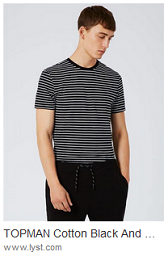
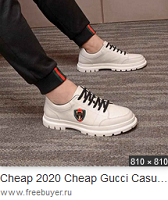








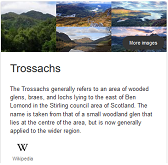




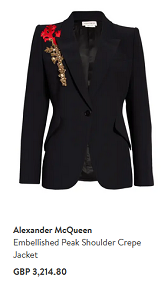



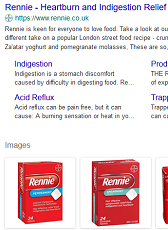
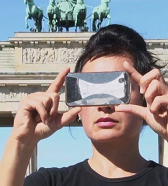
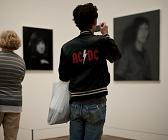


The room is white, all white, molded plastic white.
No windows, what's there to see, anyways?
It is quiet as the womb, noisy as the womb, buzzing.
There's a little valve at the top through which I can see the tiny metal nozzle of the sprinkler system, a check to make sure this chic bubble doesn't become my fiery tomb, in case of malfunction.
This whole all-in-one type thing was trendy when Zaha Hadid did it, elevated the first time it came back as a trend, but now it just makes me aware of how easily the complex could, if I happened to pass away, by some novel contagion or structural defect of the heart or my own hand, divert a spritz of harsh cleaning fluid to the room 74b sprinkler valve and, once my corpse was carried away in a bag and the possessions in my satchel cleared away for investigation and then dispatched to my next of kin (parents), spray the room down to obliterate any of my biological trace.
Ready for another visitor in the museum of accidents.
And above all, I'm wondering, in this context, why on Earth is the bedspread this bright, shiny orange?
I flex my fist on the surface, dangling my feet (still in the leather oxfords) off the end of the bed.
It gives the whole room a discolored, feverish effect.
Is the plastic really white?
It's like how flesh is painted, which is also like flesh.
It's true!
If the pigment in the paint used for the top layer of flesh begins to degrade, by poor technique, poor finishing, poor preservation environment, and finally, the cruel march of time, the rows of saints and angels and even Christ himself take on a nauseous pallor, green brought out in the attempt to simulate our own bluish veins.
Living! Real! Art!
I have a headache.
I rest my hands on my face, press on my eyeballs.
It helps a little.
I have been staying in this room a few days now, to see the last leg of the project through, to make sure Janine's work is all comfortably interred I mean preserved in Vault 819.
I know, even when I turn off the one light I can control, the blinking of the little clock, the fire detector light, my devices flickering to life etc etc will all wildly refract off both the smooth, brilliant plastic and garish orange bed cover, and the photons will continue to bounce around more in this closed environment, giving it all a sort of unreal glow as they go clattering around faster and faster, all night.
Groan!
I press the pads of my thumbs into the centers of the round dial-faces nestled in my palms, and a reading acknowledges that my heart is racing and I should be asleep, actually.
My old-fashioned mind knows this means I shouldn't have drank so much red wine and that my thoughts are racing too.
I diddle one dial with the fingers of the opposite hand until I've pulled up my Fantasy Zone, and hold my hands flat, placing the dials directly over my eyes, like I'm covering my face in embarrassment, or holding a book very close.
This is where the Algorithm begins to pull.
"It knows what I like better than I do" I think (because this is what everyone reflexively says about it, it is relatable and the polite thing to say when kicking off a conversation primarily consisting of reiterating the things it spit up for you, a sort of dream interpretation via the better, more ideal dreams you should be having)
...though I have to wonder what is more intrinsically, pre-consciously known than desire?
No, you know what.
It either knows me not enough, or too well to the point it becomes speculative, a future me I should get ready to desire-like.
It's not me.
It's alien.
I have never met someone with a nexus as utterly banjaxed as my own.
Maybe it's broken, or my desires are too scattered, or I desired a wrong thing or series of wrong things at one point, and the poison is in it now, it'll always throw up something slightly wrong
--ulp-- my stomach...
Point being I can see elements of the Algorithm that point to myself, but it's like the lens is bent, or no, it's not a fixed view but something that's always moving, always crawling.
It doesn't have the nobility, the cold perceptiveness of the glass lens, which I aspire to.
I despise it.
I load up the last fantasy I was in the middle of and prepare for it to work over my mind and body, until I'm exhausted enough to maybe sleep until morning.
The walls are thrumming around me, very orgasmic already.
The tunnels are dark and organic, but they open up into cleanly man-made rooms, moments of lucidity emerging in dreamy chaos.
Our star is crawling forward, through the improvised tunnel.
Already I can see her calves flexing, torso contorting left and right as she twists her way forward, strong, desperate, getting scraped with dirt and stones as she goes.
Her breath catching, chest twisting and heaving, she still has to go on.
Finally she reaches the breakthrough point, the tunnel hitting an air vent through which she can drop into the vault system proper.
Such a vent does not exist, and if it did would be impossible to simply dig your way to.
For the purposes of a fantasy heaven and earth can be moved. But I am getting ahead of myself.
There is not much imagery of art storage in the public imagination database; a lot of people don't know how sad and sterile it really is.
I get in with an old-fashioned ID card and have to go through an electronics detector every time, to ensure there are no cameras on me so that images, of the holdings or otherwise, could scuttle outside.
The vaults themselves are uninteresting, the art inside them is also, almost always.
In terms of what art storage really looks like, I guess there's that scene from _Children of Men, but that imagery is probably hung up in some obscure premium level or hamstrung from existence by second or third generation copyright ownership by now.
So the machine grafts and makes do; the fantasy shifts to occurring in something like the great vault of a cave that opens up when tunnels drop away, something like a nuclear bunker, something like a prison, something like an airport lounge.
Fair enough.
And it's not so far from the truth. What the Algorithm ends up fusing together is similar to the very complex my abandoned body is fantasizing inside.
The Trossachs complex expanded upon the network of Cold War era nuclear bunkers based in the area surrounding HMNB Clyde to offer a wider array of security and risk reduction services.
It has accommodations on site for staff, contractors (myself) and patrons, is nestled alongside beautiful woodlands, in an agreeable post-union anglophone tax haven state, under several decades' less scrutiny than Ireland, and more temperately continental each decade.
The facilities are proven indestructible, top of the line, cutting edge climate-controlled vaults, managed with utmost discretion and deep within a maze of audio-visual, biometric and blunt force violence security regimes.
It is the most divine stage on which to do my work of research curation and collections care of delicate, near-contemporary work.
And it's the most beautiful place for the complete work of my dear friend and colleague, Janine Gray, to be interred as a precious cultural asset of my employer, the London-based Mr. Hyphenate-Lastname, passionate collector-philanthropist, multi-billionaire... oil baron... financial speculator... weapons manufacturer... whateverthefuck.
The heroine is crawling through the tunnel, straining herself to exhaustion, to reach the depths of institutional art storage, secretly.
Chilly, often damp, these state-outsourced warehouse size prison cells are less cozy and refined than the true halls of power, comfy, carpeted capital, where now I lay.
Sad truth is though that it's often the pond where tiny fish compete in worsening conditions, hoping to become the fat carp scooped up to be feasted on by the herons that come down occasionally.
I was once that little fish, or maybe I was a tadpole, too small to be noticed until I crawled out by other means.
Janine, though, she nearly leapt right out of it, no, has, now. I can rest in that.
Anyways the heroine, a devoted, enterprising intern on the ladder of cultural Power, is crawling into the vaults in pursuit of her Artist, this time a guy, I think I'd prefer.
Because he's kind of gone missing, a bad sign, usually meaning he is getting variously captured or tormented or roped into some awful scheme like doing some design work for a festival funded by Northrop Grumman or BAE Systems or Shell or Amazon or Facebook or whatever.
Inadvisable and costing what little dignity he has as that mercurial figure allowed outside the harsh prison of productive toil. He can do "what he wants," but each of these decisions, at this stage, have a chance of flinging him back down into packing boxes in a warehouse or delivery driving with whatever excuse comes to hand.
He has to be _careful!
It's gauche and also a ripoff to hand yourself over to the contrived publicity of these awful machines, surveillance, war, the state, so soon and under the minimal stakes and poor conditions even success would offer at this point.
The intern knows this, and is hot on the trail of fixing a pending injustice.
The intern reaches the conveniently loose narrative vent, which she has to wrench side to side several times, rocking the arms and shoulders that were holding her up from the dirt back and forth.
Eventually, the last half-inserted screw gives, and the whole thing clangs to the ground.
She's broken through!
She steps out into the wide, grey arched hallway.
Her boots make a smart, urgent sound on the tile floor as she moves like a precision-guided missile towards where she knows the action is.
She rounds a corner, presses an ID card against a sensor, and the situation, worse than she imagined, is revealed by a languidly sliding door.
Despite his helpless stupidity, the artist, I love you. You are not me but you are the same as me inside. We have shared knowledge and passions.
In another life, maybe with a bit more self-esteem, I could have been you.
I mean, I am you, I am all of these characters, but I always take an extra delight in imagining and then making things happen to you.
The artist, it brings me no pleasure to report this...
No, it brings me chortling glee, that sort of private hard exhale that pulls out of you when something is really great or really funny even though you're alone, in total silence...
Like I said, the intern is highly distressed to find the situation has progressed to the point that you are prostrating yourself on your knees in front of a long row of receding painting racks, the first layer of stiff governmental portraits looking on disapprovingly.
You are prostrating yourself at the feet of a massive, dominating woman. She stands like a monument, in heels.
The superego, the funder. She's looming over the artist, gesticulating at something or other.
Now, don't be difficult!
We're so happy to have you here.
But you know there's 100 of you waiting at the door, right?
So work hard and don't complain, and don't think about the funding sources or institutional context too much, and several other statements that would be pulled out as worthy of pause if any of this grimy altercation was negotiated via contract.
She moves closer. Her hands haven't touched the artist, not yet, but he doesn't see that her claws are already sinking deeper into him, sectioning up his meat.
What else to set the scene? Clothes.
The Algorithm is brilliant at clothes, the thing that there exists more images of than almost anything, except maybe breasts or automated top-down views of highways.
The intern and the artist are dressed in the practical clothes of the precarious yet striving motley of cultural workers. Both wear cuffed black jeans, to different effects.
The Algorithm pulls up some illustrative items immediately, especially when how they functionally wrap around a body is secondary.
Hers are more loosely-cut than his, but to make up for it she's wearing one of those light, tunic-y blouses that is loose towards the bottom but pulls in low and tight around the breasts, a sort of apology for her practical, steel-toed boots.
She's still not sure what to be and feels the need to always keep one thing on her person that's making some sort of womanly effort, like papers she can present to a suspicious security guard.
The artist is wearing one of those black and white striped shirts I love to look at men in; the kind that makes them look so generic and kind of dumb. And trainers, this is the only part of his outfit selected with any hint of self-consciousness, because he thinks it will make him seem "down to earth," soften him a little bit.
He is no intellectual cliff face, he doesn't need to worry about that. But his vulnerability inspires care, adoration, or maybe sticking around, waiting to see how he'll get humiliated.
He calls everyone who falls into any of these emotional categories in relation to him, his "network."
His antagonist, the superego, always stands on a pyramid of skulls, even if it's not visible in the current setting or within the proscribed parameters of the scene.
It is an empire of prescription pill bottles or oil spill money or the endless brutality of "national identity" which some of the elect jesters are rewarded for representing, as if to say, aren't we a great, civilized country, to let _this_ particular weirdo paint, and express their groveling gratitude, demonstrate our superiority in culture, etc.
She holds the purse-strings, so she doles out the punishment.
She's also a woman, what? I don't know, it just suits me. I never desired domination from a man.
I know it's not very accurate, word of Freud, but the nice thing about the algo is that it can pop the two halves of male dominator, male who eternally denies etc apart and seamlessly suture a woman on there.
Even if some would like you to think that we have the nicer brains, that we're biologically or socially predisposed to being friendly or harmless, history has produced countless monsters.
She has a horrible liveliness about her for an old woman. They're always like that.
I look at them with their trendy statement necklaces and suit jackets and think: this bitch will never retire.
Eight hiring cycles of people like me in jobs that hold at the same miserly salary for decades and double-decades will wash up on her shore before she even considers eroding.
As hip as they consider themselves they still act on behalf of a tight trifecta: money, tradition, power.
These pillars are as tautological as her tailored blouse is taut across her breasts: Money is power, power sustains itself with tradition, and the tradition is what justifies the expenditure of money.
If you don't have money or power you have to graft yourself into the tradition somehow, which is what the artist's training maybe, distantly, enables him to do.
I'm not an artist, though I am a Woman in the Arts. More like something in the arbitrary shape of a woman, most of the time, and I hardly even wield it effectively.
When they started calling the girls who got the flashier internship positions "gallerinas," I knew this was not a context I could excel in, the overtly customer-facing end of things.
A serious, frowning woman like myself would have to pursue a very serious, frowning line of work.
International businessmen want to look at a pretty girl when they're in the mood to spend money and a homely one when they're in the mood to protect their investments, so I bore down, and became a sort of expert in the ways the art object goes wrong, pulls itself apart or collapses in on itself or turns to dust. Which are all inevitable, by the way.
I tell them how all of this can be, at the very least, judiciously slowed and managed, when they're sweating and begging for some good news, having comprehended a sliver of the enormity of their smallness in the universe.
Is it weird, now, after we were supposed to have been digital, that so much is still books, canvas, pigment, paper, ink?
We found out quickly that, with so many remote-activated kill switches, the digital was for things we wanted to conceal or be able to strategically forget.
Power's heritage was still the noble object, the fascist aura.
Like every other good student of art I read the Benjamin and willed myself into taking the exactly wrong lesson from it; that was how to succeed.
I became a servant of the order of reducing contingency. Preserving history if you'd like it to sound nicer.
The mountain of skulls doesn't discriminate per se, but it does like things to only be exactly what they are, you know? Simple stories. Predictable. Affirming.
So it makes a really wonderful setting for pornography.
The intern looks at the skull mother with awful distaste, then looks back at the artist, who is cowering and eager to beg for his life.
He'll do anything, he'll utterly debase himself to avoid being consigned to oblivion. Good!
The intern steps in to say, I will protect you from this vile, merciless woman, by which I mean I will at least get in between the two of you.
Underneath this whole fantasy is a sort of sucking fear, maybe that this has already happened to me, or will someday.
It has to be fantasized as such a violent, awful act, because realistically, I feel like I could miss it. It could pass me by. I could spend my days nervously outrunning it when it's already happened.
I wish I'd know if I was doomed, rather than always feeling as if it were an important and open question.
There's the erotic appeal of extreme desperation and pain, its proximity to death, a little preview. There's the eroticization of my profession, my own entrapment and indignity, and so on.
It's all very obvious. Leave me alone.
Of course, the Algorithm would rather I imagine something that can be transposed together from a few perfect, beautiful 3D model bodies, a typically exotic locale, some standardized sex positions.
It has no sense of the erotic, so my genuine desires are hard and come out wrong.
The intern's attempt to create some space by sandwiching herself between their two bodies doesn't work, of course, but it's a beautiful, valiant struggle. The struggle is slowed and elongated by the intern refusing to throw a single punch.
She tries to talk it out, which makes the other woman's gestures go even more wild, makes her lean her tight, couture-sheathed body in closer, making the intern lean back and feel the artist against her legs, tripping her like a dog, then clinging around her hips and waist to push her back upright.
Her blouse is sliding into disarray, revealing a telling sliver of the embarrassingly plain taupe bra underneath.
Finally, enough! The icon of female empowerment in the workplace flings the intern across the room with a wide sweep of both arms (towards the door, remember, the paintings!) as if to say "Who even _are_ you, anyways?"
(She's been writing and scheduling all the posts for the museum's Twitter feed for the past six months)
Despite her practical treads she can't catch her footing, and slides on her thigh, which stings sorely and thrillingly.
Mother Superego is closing in on the artist now, and she will make him behave. She pulls him up from his slouch, turns his concern away from the disposed hireling, tilts his chin up on fingertips.
He's almost convinced. Those sandwiches really are pretty miserable when they've been sitting out for four hours.
The intern cries out, in genuine, heart-rending desperation: "Stop it! You're making him so pathetic! You're killing everything, all the way down!"
The artist is moved and tries to see how much leeway he can negotiate.
"Yeah, I mean, can't you change the name? Like maybe after a broader, more uniting, humanist concept?" (Implication: rather than a purely kleptocratic piece of self-annihilating and absurd policy?)
He edges forward on his knees to show his openness.
There is a horrible cracking sound.
The artist finds, with some disorientation, that he has been smacked across the face, hard, for taking that step forward.
His nose starts bleeding like a faucet too, but he doesn't notice it right away. This is new.
His mother, he is a cherished only child of a single mother, of course, was pained to ask him to do things directly, she never even raised her voice at him--
Right. The Superego Superbitch is about to raise her voice very loud. She calls for the guards. The ejection and exile proceedings will now begin.
Two interchangeably meaty security guards enter with the purposiveness of moving gymnastic equipment around. They pull up the intern and the artist and hold their arms behind their backs.
Shit. Two more then.
Two more guards walk in, and start laying abuse on the two cultural workers held prone to make sure they can't resist enough to damage any historic fixtures on their way towards being dumped outside.
It excites me so much to see the way they both strain against restraint, gasp and curl when kneed in the gut, retch, drool coming from the sides of their mouths.
The intern's blouse is fully torn open now, chest all exposed, but it's a detail that seems almost irrelevant as the focus of the scene narrows.
The superego takes a prim step back. It's so long past the time she last faced any of these rather standard troubles within the culture industry (metaphorically).
I remember them. The indignities that would land on you like a bag of flour, and the only presented solution: give more of yourself.
Again, and again, and again.
The guards who got called in look at the two with murder in their eyes but it's a murder eternally deferred.
Nothing here can actually kill you, after all, it's the realm of disinterested contemplation, of beauty, of culture.
If you die in the game, you don't die in real life.
You just disappear.
The artist and intern writhe like salmon leaping upstream. They don't really have much feeling about the outcome, now.
The fantasy always reaches this point and, oh, I sigh.
How wonderful to be so thoroughly and unquestioningly beaten. It's such clear, awful, terrifying feedback. And what can you do except receive it? There's no runaround. It puts you in touch with the shallow, immediate planning that comes from pain. How good to forget. How good not to strategize. How good to groan, to sweat, to bleed.
And when the guards are finished roughing them up and dragging them back through object storage, up the institutional marble staircase, through the regal country home doors, and down the gravel service road that leads to the back door, they find a slight hill next to a cemetery covered in hysterically green grass.
Some flowers have also sprung up. And they drop them there, eager to return to the identical spine-cracked old paperbacks they left under the ticketing counters for the four separate paid exhibitions on this week.
Bluebells, bluebells, bluebells, bluebells.
They're dumped on a hillside covered in bluebells, their faces are flushed, they are groaning and sore, covered in abrasions and fresh bruises.
Their breathing is heavy, and they move towards each other across the grass, to feel a foot against calf muscle here, a hand against heaving torso there, to press against something amidst the sinking, disoriented void the beating has put them in.
It's an ecstasy for it to be over. It's the greatest relief of all.
Please, it'll never feel like that for me. I can't even be forced to rest, like this lucky pair.
I can't sleep, my heart is pounding, and I'm no closer to--
Oh god, the persistent tip of a folded flower bud, pointed and hot-pink in colour like some sort of alien growth, feels like it is pressing into me, blooming, growing out...
What?
Not there. More like into my stomach. Am I going to throw up?
Is this the warning stab of pain before my guts evacuate, one way or the other?
I think I should get up and go to the bathroom, just in case.
I'm not sick. Or not sick in that way, even though I stand there for a few minutes, head spinning, gripping what I can of the curvy plastic counter, trembling.
Even though my body is racked with drawn-out urgency, as if I am both quickly and painfully slowly about to be stabbed, my stony retentiveness is my finest quality.
I pop 3 Rennies out of the blister pack left on the counter and let them disintegrate in my mouth as I lay back down on the bed.
I can't sleep. My stomach is burning and my heart is pounding.
I start thinking about death again, the sprinkler head, how I'd be sealed off so even the slight stench of my corpse would never reach any priceless manuscript or canvas to microscopically stain it.
Maybe it wouldn't be so bad.
I start crushing the mint tablets with my tongue and think, how long would I have, what would be the last thought going through my mind, if my heart just up and stopped...
It's too much pressure to bear. Being a massive question to contemplate, my brain produces nothing, but it's a long stretch of frustrated, hyper-alert nothing.
God, then, if I can't try out death, can't I just have the routine, temporary oblivion of sleep?
I try to think about something pleasant, salvage the fantasy. The device's screens are still resting in my palms, but I've abandoned them at my sides.
Usually I can keep these fantasies pretty close, in the realm of the still-feasible.
The good pizza place. Running my hand on a mossy wall. Sitting alone on the train. Snuck glances and friendly conversations with a still-viable work crush.
But then, without my permission, instead of just riding my fingers along the ripples near the surface, memory plunges my arm in deep, up past my elbow, to my shoulder.
...
Yes. I'm sitting in the student center having a late lunch. A packet of prawn cocktail crisps, a diet coke, a chick'n and mayo sandwich.
Why do I even remember this meal? It's the heightened awareness of everything being new new new, my country-mouse self in a Cultural City for the first time. Even the packaged sandwiches are cosmopolitan.
That's not to say that it's a wonderland. In hindsight, the obvious problem is not evident to me.
I'm sitting on a little concrete ledge that is not meant to be sat on, because all the tables are already taken.
The student center is already bursting with people who have quickly congealed into tight friend groups, and I am alone.
When I saw her, the pink silk jacket, the blunt bangs hanging half-over her eyes, looking around the student center like it was a sublime high up view with a large black folio tote slung over her shoulder, she exuded so much charisma alone I instantly assumed she was some kind of artist, not even an aspiring one.
She looked at me and said:
"Umm... do you know where the bookstore is?"
I hid my face behind a triangle of sandwich as I swallowed, shocked she would ask me. I must have seemed like I would have known.
"There is one in this building, yeah, but if you need stuff for the art department courses, you have to go to the one over in the studio building."
This was a good 30 minutes' walk away. She frowned, then hoisted herself up on the ledge next to me.
Now I remember why I can recall that lunch so clearly. I offer the bag of prawn cocktail crisps to her, to take one, and she's delighted. We're friends.
This was how I met Janine.
I adopted the correct strategy, which was that I didn't need to be loved broadly, I just needed the right person.
When I came to the studio very early one morning, to blast psychedelia and work on my replica sampler of early renaissance era altarpiece restoration techniques, Janine was there, having obviously spent the whole night.
She was frowning, a whole semicircle of incredible drawings fanned out around her on the floor. She held one up against the scuffed white wall and seemed unhappy.
"What's up?" I asked.
She thought a while, tilting her head at the drawings, before she was even able to articulate the problem.
"I have a crit today and it's... I feel like the professor doesn't really look closely at my stuff. So, I dunno. I have to pick out what to put up and how so it's more of... some kind of coherent thing, you know."
"May I?"
"Yeah, don't be overly precious with them."
I picked up one of the drawings. From far away it looked like a cloud of breath at night; up close, the packed-in metropolis of lichens growing dense on a twig, and these two states were webbed throughout each other.
I said, "tell me what it is." I put down my own bag. She told me while I skillfully measured and cut some sheets of forest green mat board.
It's a cathedral of narrative, feelings and association that lazily stretches its arms up; I condense it into a tight paragraph of slightly thinkier words I repeat back to her, pinning up four of the matted drawings in a tight grid.
"Oh my god, you just get it," she said. "You just... put it together."
I do all this. She's implicitly in my care, though I don't mind.
It doesn't feel like work because it excites me, and I can feel it constantly stretching and improving my own skills.
I provide the ability to intuitively master language and absorb context that she lacks... that she has to lack, or her drawings wouldn't be so sensitive, so absorbing.
I could always massage her own chaotic, enthused explanation of a piece into a mirror-shine block of International Art English.
She'd read it and say: it sounds so _real_ now! And I would flush, tuck in my chin, try to be humble.
Bouncing ideas off of me, her work explodes. So does my own.
My vocabulary for describing marks on paper spiders out further than I ever thought possible, and sometimes feels so intimate to her work that it's almost like lacing my fingers into hers.
Of course I went above and beyond, precise hanging, hands-on thematic curation and even a small publication, much more than I was expected to do for the portion of the graduate exhibition that I was responsible for.
And my efforts, in presenting and interpreting her work, helping her apply for grants and figure out which competitions and shows were worth submitting her work to in a sea of scams and the embarrassingly provincial, gave her a furious, glowing sense of "buzz."
I was happy to only ever peek out from behind her.
At the opening she had to keep coming back to me, pulling me over to a new wall label to stick a small red circle sticker onto. Another buyer.
I was pretty sure our budget was exceeded but someone kept opening bottles of wine. Each time she took more of my arm in hers.
After the opening we all piled into a tiny karaoke bar to get even more drunk.
Of course the other art students involved were in high spirits, their work had also looked good and some of them had also moved a few pieces.
But there was a quickly cohering sense that Janine was the obvious star among us, that this had been her night.
All of her work had sold, and she was strutting up there on the small stage, only a platform a foot off the floor, really.
She waved and winked at the DJ in the back, kicking off a rowdy round of late night karaoke.
Janine's charming, slightly rough voice was, when she concentrated, perfect for hitting Debbie Harry's range, and she knew it.
So she put on one of the crassest Blondie songs, one of the catchiest, and we all cheered.
It's the one about a sex worker who gets entrapped by a cop while she's on the job.
A normally dangerous and immiserating situation is transformed into the material of fluffy pop hits because it's about how desire and romance can make even the inside of a cell, the grip of handcuffs, feel charged with possibility.
Maybe it's in poor taste, an object of complicated, difficult identification, but it imagines an unreal world, a world without these rote, practical harms, where harsh reality is ephemeral, where the power of a fantasy makes everything else irrelevant.
In the middle of the song, Janine stared across the floor at me as she sung the most audacious line:
I thought: Janine, did you already feel like a whore?
Not in the sexual sense, but in the sense that you were already giving away too much, too fast? That you were becoming what others wanted before you could even get a firm grasp on what you wanted?
Even though I was excited as everyone else, when you looked at me I had a moment of doubt, or hesitation at least. This was no longer something between the two of us. More people would always be involved.
When we graduated in a few days our gated garden would be dropped right in the middle of The Real World--
No more learning, no more experimentation. We'd have to sell ourselves or drown.
So if anyone ended up being a whore it was me. But I had synthesized promiscuous hand-shaking, rapt nodding, and the language of salesmanship and assurance with what I "really wanted," I thought.
Maybe it was a void then, still, so it was easy to fill with something else. I believed in your work, it was fantastic. And I believed in you. I was selling my own fantasy, my own adoration.
It worked. Look at the longevity I've secured you now, Janine...
Sometimes I fantasize about becoming an art terrorist.
The Algorithm doesn't really seem to know what to do with this information.
You mean you want to end up on top of the world with your successful art career?
(Of course, those who can't do, curate.)
You want to make art about your friend who died, in part fleeing accusations of terrorism?
You want to make art about terrorists?
Maybe I don't know what to do with it either.
All I know is that I want to wreck it all somehow.
Just make it stop.
To destroy art has begun to seem profoundly glamorous, then necessary, a sad and worrying state for someone who's meant to wait on it hand and foot.
We sent out the Voyager disc I think to present our art, in the broadest sense, words and music and images and sense of place in the universe, because we were desperate for it to circulate beyond ourselves. Not just at an individual level, but at a planetary level.
No one seems to get teary eyed at the thought of it out there the way I do anymore. And my definitively-held private belief is that even if there was some general interest in doing something similar again, a century-and-change update, no one would want to open their vaults.
Everything is owned now, and who knows what extraterrestrials would do with our _intellectual_ property if they found it?
They might find it so compelling they make bootleg copies to hand out to their friends, or they'd all crowd around it and take a picture of it for themselves with their equivalent of our own devices, or they'd even use it as raw material, incorporate it into their own work.
All unpredictable, all unacceptable. When the future can't be controlled, it can't be isolated as a maximally reliable asset to extract value from.
...
Shortly after the show, when interest around her work was mounting, Janine died.
Motorbike accident.
Standard, drab, unglamorous.
Horrible.
Her work had been selling but she'd rightly been attuned to how fast the tastes of collectors can change, how contingent and unstable favor was, and so thought it would increase her chances of success in the long run to keep up with the shifts of high speed parcel delivery she could fit in.
Nothing is guaranteed, after all.
And I guess she was right.
Now that her work was scarce, made into an elegant closed set, at the moment of its ascending trendiness, attention exploded. She never would have had to work a shitty side job again.
She only had to die.
Thinking about this snaps me stone sober.
I'm not used to crying about Janine. Not recently anyways.
It was my job to talk about her as a closed book, an ended, static thing, to ensure the collection and display of her work was carried out in the most informed and respectful way in her absence, to manage the endless forms her clueless parents would get wrong.
I had done what I needed to, been healthy, normal and sane about it. And I had done it all well!
And it's all fucking garbage! I let the tears run horizontal across my face, hot and ugly.
People SAY they would feel or act more NORMAL if it wasn't for the crush and competition and time pressure of capitalism, always hunched over us like LEVIATHAN. But even then I find such a premise underwhelming, trying to bargain with the big man himself, right? Just give me a break and I'll be GOOD. FUCK IT. I have been acting and feeling NORMAL for capitalism my whole life, it was the devious awful thing that first planted the concept of NORMAL in my head. Every bit of myself that has not merely winced through punishment, mangled the words so clear in my mind, shoved down or belittled or flagellated my own feelings, has been HARD-FOUGHT to preserve. When we blow the whole thing up everyone had better get a hell of a lot weirder or I will not even think it was worth it.
Sometimes I feel like my anger is abnormal. And it worries me.
Thinking of Janine is stabbing me in the heart and I can't stop it, I deserve it, I can't do anything about it.
I've committed her to hell for six months of cushy contract work.
Vultures. They only love her dead. I really am going to be sick.
...
No.
My clammy, unsteady hands grab the dials, pressing them to my palms, holding them to my face again, except, I open the email client.
The email I typed out and sent to my line manager, one of the Wealth Management Curators who distribute specialists across the vault complex, twitching my fingers along the top of the device, no salutation, no sincerely or best following it, read:
"I'm quitting this project, and don't try to appeal after me to change my mind. Eternal life or universal principles don't give me any comfort. They have part of the uncanniness of the corpse. They have part of the uncanniness of the android. Or algorithm. Isn't it so horrible, so repulsive, to just scale up the most vindictive, absolutist manifestation of a human subjectivity, God, and put up flags along it, that this is the end of the universe and everything that can be contained within it? For everything to be understood under that banner? A true materialist would believe that everything is changeable, therefore everything must be changed. Forgive me if this causes you any intractable troubles."
I pull the device off my eyes, unpop the suction pads from my palms. The email is sent.
She'll probably think I got wine drunk and sad and philosophical, and don't mean it.
I should have been more formal, or maybe I've been too formal with my life, and from here on out, pronunciations like this should be taken more seriously.
Then when the situation in the vault is discovered, maybe months or years down the line, she'll think I'm insane.
I stand up, leaving the bit of hardware behind on the bed, and pad through the fleshy, undulating dark, heading out into the hallway.
Hit the music.
Leave the room, and make sure the device left behind. I won't be needing it anyways.
Nod at the guy at the security desk. I have a reputation for being a night owl, don't I?
(Being alone with Janine's work during the day sometimes isn't enough.)
"I just thought of something, with the materials in Vault 819. I just have to fix it or I won't be able to sleep."
He hardly looks up. Given the value of the assets held here, there's surprisingly little questioning once you become a familiar face. They trust that the buy-in is high enough, that you would never risk it.
Of course, for me, getting here, the cost has been almost my entire life, since I don't have much money.
I scan the ID card and walk through the electronics detector, and the display proclaims me innocent as a baby. The carnage is all in my mind.
At the control panel for Vault 819, I bend the macroroutines for humidity and temperature into long sine waves whose peaks and valleys hop over each other.
Maximum variation, maximum disruption, but at a scale that will hardly register on the weekly views these dilettantes glance at, to convince themselves they're informed.
I walk one last circuit of Mr. Whoever the Fuck's masturbatory hoard-against-death. My skin bristles at the subtle change in temperature, the room starts to feel wet.
No, I'm thinking ahead, getting too excited.
I place an ungloved hand on the folio box that holds the last batch of Janine's notebooks. I don't need to open them to look. The parts that matter are all in my head.
Deep underground, one of the vaults is breathing now, when it should be holding its breath for all eternity.
The fluctuations in temperature and air pressure and humidity will gradually slide its fingers between pages of folios, into the pores of the wood frames holding the canvases taut and still, water will condense on metal, wear away coatings and trigger oxidization.
The endless Warhol canvases will writhe in the dark, pulling themselves apart and destroying their perfect finish.
Janine, your notes and manuscripts will bloom with mold and and spores smuggled in by the skin flakes and dust and fingerprints on its surface, microscopic remnants of the time we spent poring over them, touching them, letting crumbs from chewy chain store croissants and sugary coffee residue fall on them.
Your work will go from a speculative investment held against the future, to living, disgusting rubbish; exactly what you would have wanted.
I've smuggled you back into life, here, in one of the most terrifyingly dead and unchanging locations on Earth, in the tiny bit of history and chemistry it allows to exist, so long as it's called a patina.
It's peacetime, I'm just a curator, I can walk outside.
I would have to go back to my room, remember to pick up my device if I wanted to come back inside.
But I won't.
It is the still-dark morning of an advancing early spring.
The air is eerily temperate with just my coat.
I don't have to be dragged out.
I can leave by choice.
I flop down in the nearest crest of springy grass I can walk to. Dew is collecting on the blades, and it's cold and wet on my cheeks, my hands, clarifying.
I imagine around me a forest of bluebells bluebells bluebells, soon. And after that what I will, what I care to do with the rest of my life, now that I've let all of it that is behind me run free.
...
...
...